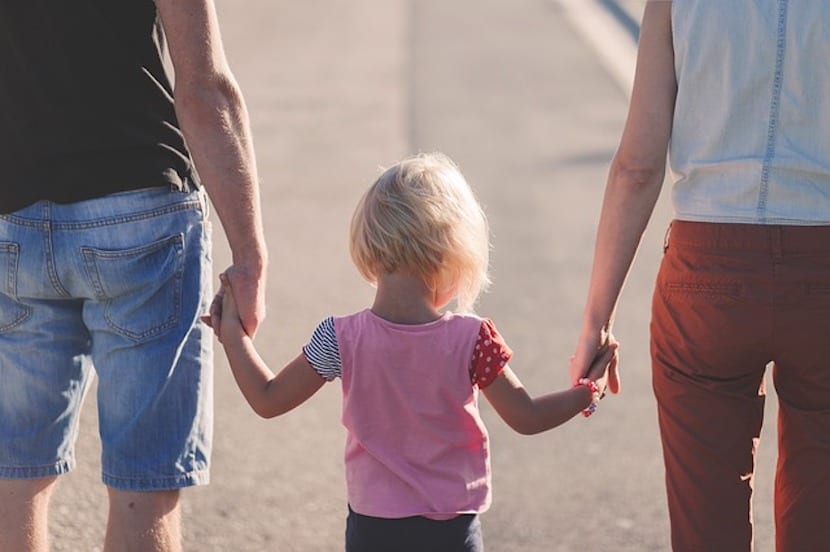
According to we have read in eldiario.es, the Ministry of Health, Social Services and Equality, "It is preparing a draft law to establish joint custody as a regime that is just as normal as single parenting". In April 2013, a ruling was protected by article 92 of the Civil Code, and held that joint custody should be considered normal and desirable. Since then it has become the doctrine of the Supreme Court.
But how is joint custody different from single parent? In the second case, one of the parents is the one who spends more time with the children, while the other is granted visitation rights and the obligation to pay alimony. While with joint custody, the little ones spend more or less the same time with mom and dad.
The courts are increasingly ruling in favor of this model (in 2015 up to 24,7% of the separations of couples with children ended with joint custody). A priori it could be the "ideal" solution, but is it for everyone? For example, one of the criticisms that is heard is related to the generalization of this custody, even when there is no agreement or understanding, because it should be remembered that precisely to grant it, precisely those conditions would need to be met. Each family is unique, each separation also, each case should be studied in a specific way, and this is incompatible with the future standardization of the measure.

And the approach was like "coffee with milk for all"?
The rule would be national, thus overcoming possible territorial inequalities in the treatment of this issue. In favor of the generalization of joint custody, one of the arguments points to the commitment to parental responsibility, but and when has it not previously existed? I mean, Will a co-responsibility work that in some cases will be forced? Let's not forget that one of the battles that we still have to fight in the search for equality, it is precisely that. There are so many parents who do not know the name of the pediatrician, who have never been to a school tutoring, who are not able to regulate the children's bedtime ...
Taking into account the best interests of the child, it would be convenient to make sure that it is the optimal solution in all cases, because there are families in which the children go to one house and another with total normality, knowing that their needs are covered, and their emotions cared for. But there are also those in which They are turned into "suitcase children" who do not feel as their own either of the 2 houses, and they have to endure different parenting styles (sometimes contradictory) with the wear and tear that this entails, since too many expectations are generated around the child, without the responsibility on the part of the adults that would be desirable.
The thing is that everyone does not like coffee with milk (forgive me the analogy), because there are people who are lactose intolerant, who prefer an infusion, an orange juice, a bottle of water ... That is, the general solutions were never good .

Joint custody is incompatible with gender violence.
Another major drawback is gender violence: it is known that when you have daughters and sons, they can become secondary victims; but also there is not always a complaint. So when the judge does not know that this violence is taking place, he cannot assess it, although the Civil Code foresees it as a circumstance to prevent joint custody.
Taking advantage of the fact that I have mentioned gender violence, and although apparently it may not be related, I would like to briefly mention the so-called Parental Alienation Syndrome, which neither is it really syndrome, nor is it based on any scientific evidence. However, it has been used in a somewhat abusive way for fathers to obtain custody from mothers. Understand me, I know that every girl and every boy has a father and mother, but the supposed right of the adult should not be built on dogmas, ignoring that the SAP is more an ideology than an absolute truth. But I go back to trying to figure out what the main drawbacks (and perhaps also the advantages) of joint custody would be.

Disadvantages of Shared Custody.
According to this study published in 2013 by the Journal of Marriage and Family (and made from psychological evaluations of more than 5000 North American children), the younger the child, the greater the biological need to remain with the primary caregiver in the event of separation or divorce. Even affective deficiencies and social skills, derived from deprivation, were studied. It could be that stopping habitually living with one of the parents weakened the emotional ties with him, however in the separation cases it should be looked at above all by the minor.
On the other hand, inconveniences can also arise in the calendars of attention to the children; We understand that in the case of joint custody, the father or mother may have to give up aspects of their personal life for the benefit of the children. It is complicated, but not impossible: rebuilding a life in which (perhaps) new projects fit, and at the same time assuming care physical and affective of daughters and sons, as well as education, nutrition and socialization, with all that they entail; and do it "when it touches", and also alone.
But there are also advantages ...
Advantages of joint custody (in theory).
I say in theory because how few friendly separations exist! Joint custody implies the exercise of legal custody under the same conditions and rights, and the positive aspects that can be derived are a less traumatic break (if the parents' previous coexistence was egalitarian and friendly); fewer judgments about a parent; ease of reaching agreements and maintaining communication around the children's lives; enriching integration in the two new homes that are formed from the separation.
To take into account: ideal characteristics to exercise joint custody.
The cases of 100 percent agreement and commitment seem to be scarce, but in what situations would there not be any kind of problem with this measure? On this post from Women for Health, we find:
- Explicit desire by both parties to exercise this type of custody.
- Both parents have financial resources to maintain care and education.
- That the houses are located nearby so that the children can continue with their daily lives.
- Upbringing and education according to similar norms.
- It would be convenient if physical and emotional care had been exercised, and that father and father are skilled enough not to neglect any aspect.
- They should be mature enough not to use children to channel negative emotions.
- Absence of gender violence.

Moreover there are two types in this model: a common house in which the children live with the parent "whose turn it is", and in addition, mother and father must maintain two addresses for the periods when they are not with the children; and the most common is to live close to each other so that the lives of the little ones are more comfortable and stable.
Here is a statement from the actress Mar Regueras, who points out that the joint custody formula saves money from the compensatory pension, so from his point of view it is not surprising that men ask for it. The care of children seemed to be for a long time attributed to mothers, but this could disappear. The problem is (as I have pointed out above) that co-responsibility is not real in a high percentage of cases, before separation, and this could negatively impact care for minors. That, and no less important details such as that very young children (up to 3 years old) need continuous contact with their mothers.
Better or worse than joint custody being established as "normal"? Well, it depends, of course, on many factors, but it is probably a mistake not to assess cases in isolation and in detail.